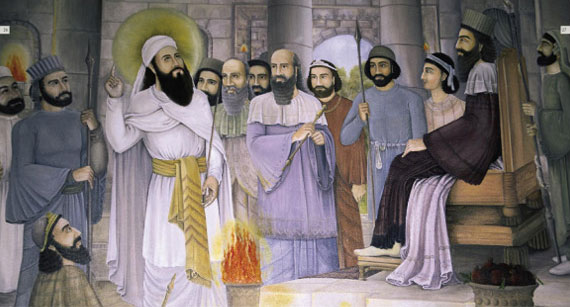There is very little known about the early days of Zarathushtra. The little that we do know is mainly because of the legendary stories that have been passed down through the generations by memorizing the scripture. Therefore, below, you will simply read legendary and even mythical stories about Zarathushtra.
A very long time ago(ca 1780 BC), in north western part of ancient Iran, today known as Azerbayjan province (in Iran), by the banks of a lake, lived a large family named Spitama. The head of one branch of this family, named Hechadaspa , had two sons: Pourushaspa and Arasti.
Pourushaspa had married a young woman named Dughdova. It is said that when she was 5 months pregnant, she had a dream in which she saw the world was being destroyed, and she was very frightened. But then an angel came to her in her dream, and told her that she was bearing a great prophet who would be able to change the impending destruction.
Legend has it that on the 26th of March; the pregnant Dughdova gave birth to a young and healthy baby boy. However, this was a peculiar baby, since unlike other babies, he did not cry. Instead, when this baby boy was born, he had a broad smile on his face, and his face was shining with a divine glow.
His parents decided to name him Zarathushtra, (meaning Golden Star) Arasti’s family also had a son named Maidhyoimangha or Maedyoimaha (Mid Moon).
Zarathushtra was growing up as a very intelligent and energetic young boy. He was very observant and had a sharp mind. He had the ability to see through the surface of things and penetrate to the depth of their cause and meaning. Because of his inquisitiveness and natural curiosity, he always had lots of questions to ask the priests and teachers of his time; however, he was rarely satisfied with the explanations that he was receiving.
When he was nine years old, some of his friends arranged that he would have a meeting with the head priest of his town, and discuss the questions that he had. Zarathushtra was very much looking forward to this debate.
The story goes that on the day of the debate, Zarathushtra and the head priests spend a number of hours discussing the questions that he had. However, neither side managed to convince or satisfy the other. The depth of some of his questions had troubled the head priest, and he left the place in deep thought.
Zarathushthra married a woman named Hvovi, before his illumination. When Zarathushtra was only twenty years old, he left home for about ten years, Zarathushthra left his family, friends and his birth town for a cave where he spend ten years of his life for thinking and searching for Truth.
When he was thirty years old, Zarathushtra left the cave for his home town while in his vision, he perceived Ahura Mazda as the Wise Lord of Creation, and the seven emanations of Ahura Mazda, the Amesha Spentas as the guardians and artisans of this physical world. He perceived the laws upon which the universe operated, and understood the inter-relationship between Ahura Mazda, the Amesha Spentas, and the Creation.
After his illumination, Zarathushtra wanted to share his acquired wisdom with the world. He made a decision to invite all his family and relatives to listen to his teachings. And then in a family gathering, he explained his understandings to them.When he finished explaining, his cousin, Maedyoimaha, decided to join him, and became the first follower of his teachings. And his wife Hvovi also embraced his teachings becoming his second follower. His children, one by one, decided to accept his religion which was called GOOD RELIGION by himself.
Zarathushtra then decided to share his teachings with his fellow citizens. When he started teaching others in the street of the city, he met with a deeply rooted resistance from the priests, who had based their entire life and livelihood on the old religions. Zarathushtra tried many different techniques, and every time he met with renewed opposition and greater resistance. In fact, over the next twelve years, he only managed to win 22 people over to his religion, including his wife and children, and his first disciple, his cousin.
Having met such frustration, and such vehement opposition from the rulers and priests of his own land, he decided to leave his homeland for other countries. He then mobilized his followers, and the group of 23 people started their migration.
To whichever land they came, and in whatever city that stayed, he tried to teach others about his religion, yet in every place they met with predictable opposition, partly due to the self-interested preemptive strikes of the rulers and priests, and partly because of the ignorance of the people, and their unwillingness to change.
Finally, they had heard that a King of a nearby country, King Vishtaspa, was a wise man and if there was one person in the whole world who might be open to listen to new teachings, it would be him. And they set off in that direction.
Zarathushtra was 42 when he and his followers finally reached the court of King Vishtaspa. The wise King had granted Zarathushtra an audience, but he had also invited all the priests and wise men of his court to attend and listen to Zarathushtra and question him about his religion. The King had wisely set the scene for a debate, if it need be.
At the debate in the court of King Vishtaspa, Zarathushtra eloquently spoke and convincingly responded to all challenges and questions. The King saw the wisdom of this man, and his teachings and embraced the religion. At the same time, the King invited his subjects to also listen carefully and choose wisely to follow the Zoroastrian religion. This was a major breakthrough for Zarathushtra.
